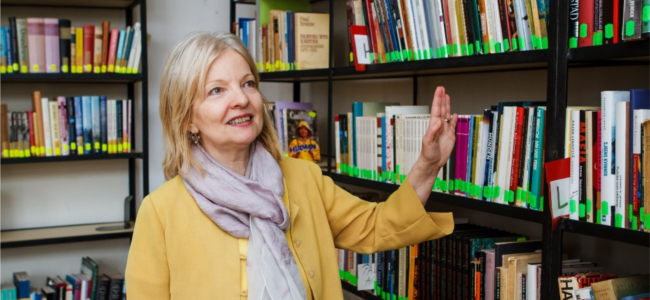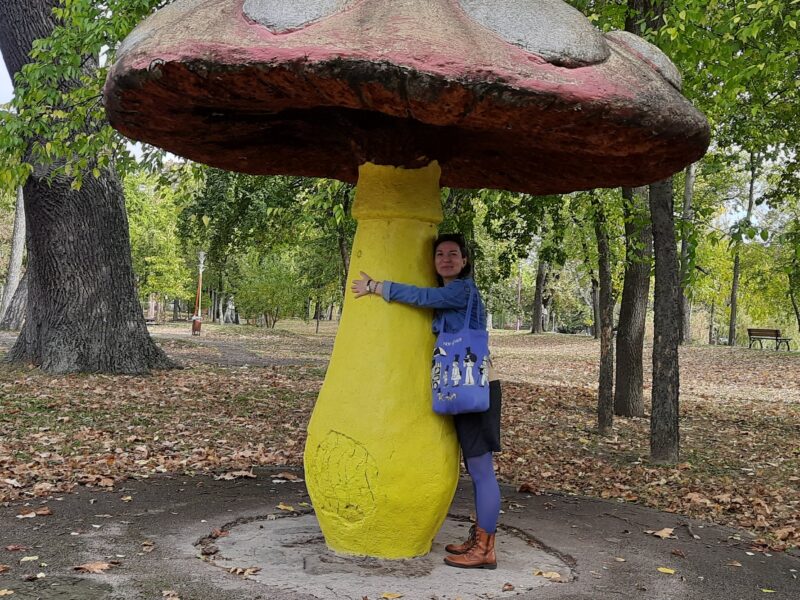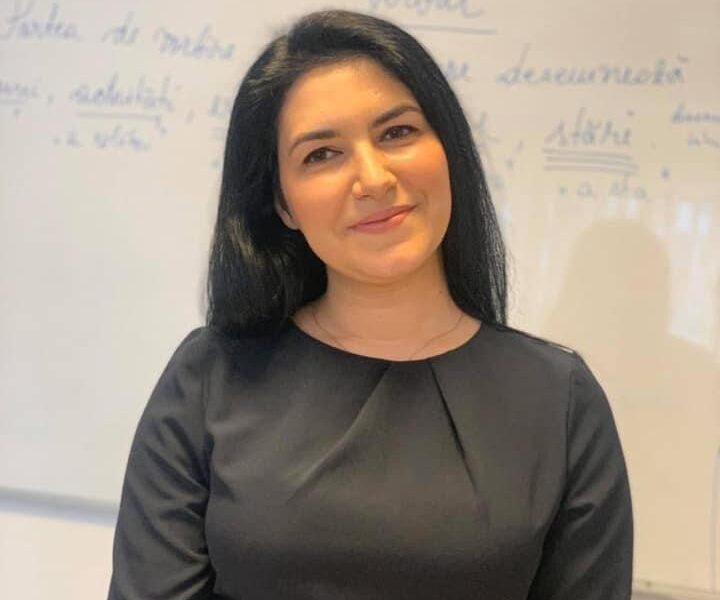Sanda Tomescu-Baciu is a university professor Ph.D., founder and coordinator of Norwegian Language and Literature programme from Babeș-Bolyai University in Cluj-Napoca (1991-2021) and director of the Department of Scandinavian Languages and Literatures of the Faculty of Letters, the Babeș-Bolyai University in Cluj-Napoca (2001-2021). Since 2010, Sanda Tomescu-Baciu has been coordinating doctoral dissertations at the doctoral school in the field of Norwegian and Nordic literary studies.She published and edited books and articles dedicated to Scandinavian literature and she primarily translated Norwegian literature. She was a member of the International Ibsen Committee (2000-2006) and of the editorial collective of the Studia Universitatis Babeș-Bolyai, Philologia magazine (until 2021). In 2003 she was entitled Knight of the 1st Class of the Royal Norwegian Order of Merit. Throughout her career Sanda Tomescu-Baciu has trained professors and translators, experts in the Norwegian language and literature. In 2021, Norwegian Language and Literature programme turns 30 years old and the Department of Scandinavian Languages and Literatures turns 20 years old,and the event is celebrated at the end of October with the support of the Norwegian Literature Abroad centre (NORLA), Royal Norwegian Embassy in Bucharest and of the Rectory of the Babeș-Bolyai University.
30 years have passed since you have founded the Norwegian Language and Literature programme at the Babeș-Bolyai University, bachelor level, the only certified major of this kind in Romania to this date. In an interview you said that before taking this step you had taught optional Norwegian classes. How did things work back then, at the dawn of a new society?
I was working at the Academy Library in Cluj-Napoca when, just like you said, we were at the dawn of a new society, a society in which I was hoping that I would make my wish of creating an academic programme for Norwegian language and literature in Romania come true. Almost a decade had passed since my graduation, and during all that time I had not lost this wish. The much deplored Professor Marian Papahagi, who was familiar with my progress as a student at BBU and then at the University of Oslo, encouraged me and suggested that I should prove that there was an interest in such a specialisation, even though a niche interest, among students. This is how I came to teach optional Norwegian classes at the Faculty of Letters during the academic year 1990-1991.
Alongside the Academy Library, I used to go to the Faculty of Letters once a week, in the evenings, where the 12 students from various faculties at BBU had had the curiosity and the interest to study Norwegian. One student was accepted at the Summer School at the University of Oslo at the end of that academic year. I owe Professor Papahagi and the young students in that academic year the impulse and the chance to rediscover the path I had chosen at the beginning of my university studies in Norway.
How did you train the first professors of the department?
As short and simple as this question seems, it stirs up many impressions and emotions. We organized an exam for a teaching assistant position, for the Norwegian language and literature specialisation at BBU, this programme being generously hosted by the Department of English Language and Literature of the Faculty of Letters. The academic, linguist, lexicographer and translator from the Nordic literatures Valeriu Munteanu, who taught optional Swedish and Danish at the University of Bucharest, was part of the exam committee. The first group of students who had Norwegian language and literature as their minor were enthusiastic and involved throughout the five years of their studies, just as they were when they began in 1991. The 12 students studied Norwegian language and literature only with me, and this was the case for the next two or three generations. The entrance exam was usually organized once every two years, until I managed to convince the alumni to take over a few classes of practical courses. The international involvement of BBU, as well as the support of the Royal Norwegian Embassy in Bucharest and the support of the summer schools of the University of Oslo, which offered summer scholarships to the students after a rigorous selection based on their Norwegian knowledge (which took place at the faculty), were an important boost in attracting an increasing number of students. In the first four years I taught alone, both Norwegian language and Norwegian literature, and from 12 students, we reached 80 after those four years. I trained the first professors by offering them a curriculum based on the Norwegian model, a model I was familiar with. I got the students interested in extracurricular activities: choir, the celebration of Norway’s national day, of Christmas etc. The newer and older professors from the Norwegian programme completed their Norwegian studies at BBU and they had the opportunity to enjoy mobility programmes at Norwegian, Scandinavian and European universities. The actual collective of professors guides more than 300 students from both the major and the minor Norwegian language and literature programmes.
What are the advantages such a specialisation offers in the rhythm of today’s world?
In the first years after the establishment of the Norwegian language and literature bachelor programme, the students confessed that they had chosen this specialisation because they were attracted to the culture, to Nordic mythology and to this linguistic domain, inaccessible in the Romanian universities until then, and which could also provide them with a bachelor’s degree. In the past 10 years, after the number of the multinational companies offering services to Nordic countries increased, Norwegian, being considered a niche language, less known in Romania, became more demanded in the labour market. Some alumni became more interested in literary translations and they became good Norwegian or even Scandinavian translators. All of these factors made the number of students increase even more in the past ten years.
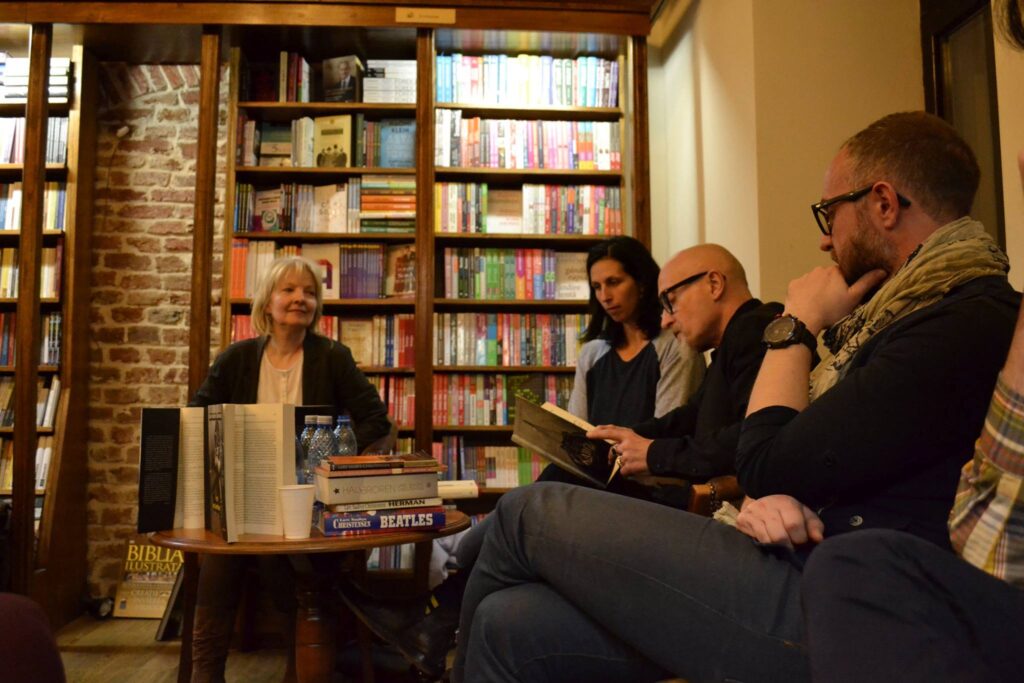
You are in contact with the Royal Norwegian Embassy in Romania; the representatives of this institution, as well as other Norwegian institutions support the department you lead. How has this support materialised over the years?
Since its establishment, the bachelor programme has received the support of the Embassy and of all the Norwegian ambassadors in Romania, who came to Cluj-Napoca on the occasion of the cultural projects we organized together.
In addition to the Royal Norwegian Embassy, during those 30 years – in which I was the director of the department – we received the support of the Bureau for Teaching Norwegian Language and Literature in Foreign Universities from the Ministry of Foreign Affairs in Norway, then of the SIU and then of Diku (the Norwegian Agency for International Cooperation and for increasing the quality of higher education) which became part of the Directorate for Higher Education and the HK-Dir skills in 2021. Those institutions support universities by offering them Norwegian language and literature programmes in foreign countries and international collaboration in higher education.
Moreover, a very special kind of support was offered by the collaboration with the Ibsenian Studies Centre from the University of Oslo, with Norwegian universities from Oslo, Bergen Agder, Tromsø and Stavanger, with the University of South-Eastern Norway, with the summer schools of the Oslo, Bergen and Agder universities. At the beginning, the scholarship programme Quota and, after Romania’s adherence to the EU, the EEA-grants programme and the Erasmus programme constituted and still constitute a major support for students and professors. The Norwegian Literature Abroad Centre (NORLA), well-known among Norwegian literature lovers from Romania, which finances the translations from Norwegian into Romanian, has been equally as helpful in preparing young translators directly from Norwegian. With the support of NORLA – with which I have kept in touch ever since its founding in 1978 by Kristin Brudevoll, ever since I was a student – we organized, together with Margit Walsø, the director of NORLA, with Dina Roll-Hansen from NORLA and with the Department of Scandinavian Languages and Literatures, a series of international translation seminars, where we invited high-profile Norwegian writers: Lars Saabye Christensen, Kari Brænne, Lota Elstad.
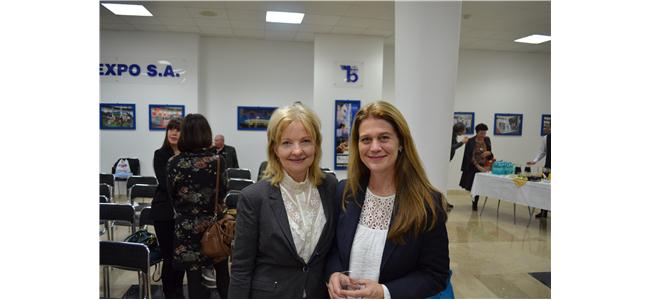
What are the most important accomplishments of the department in its 30 years of activity? Considering that Norwegian language and literature is a part of the Department of Scandinavian Languages and Literatures,is there any sort of competition between the various specialisations? I can’t help but think about the momentum gained by Swedish literature in the past years (when talking about the book market), at the ever growing interest in Danish and Finnish literature.
I believe the most important achievement is the institutional establishment. I remember that in 1974, when I wanted to take the admission exam for the Scandinavian languages faculty in Bucharest, where I thought that this faculty existed, I figured out that the University of Bucharest did not offer an independent study programme of this kind, in any Scandinavian language, neither in Norwegian, nor in Swedish or Danish, but only a few optional classes, even though they were taught by experts. Now, there is a bachelor’s programme for Swedish language and literature at the University of Bucharest.
Perhaps this idea of creating an independent specialisation which would also offer the graduates a degree came into my mind back then. I couldn’t tell for sure. However, I believe that the greatest achievement in those 30 years in which I coordinated the Norwegian language and literature programme from BBU is the institutional establishment. Step by step, I consolidated the Norwegian language and literature specialisation, bachelor’s lever, the only one of its kind certified in Romania. The department from Cluj won funding from Norway for a Norwegian lecturer from 2015 until 2025 (in an international competition), when the next competition will be announced. Our students come to study at BBU from all over the country. Today, any young person can study Norwegian language and literature and obtain a bachelor’s degree, which was not possible in Romania until 1989. Our alumni obtain a bachelor’s degree in the Norwegian language, either as a major (programme founded in 2008), or as a minor (programme founded in 1991).
The performance of our students at bachelor level, continued in their master’s programmes in other linguistic or cultural spaces, are completed by doctoral programmes in the field of Norwegian literature, programme I have been coordinating since 2010 at BBU.
Within the department there is no competition between the Norwegian and the Swedish language, Swedish being taught as an optional course in the programme of Norwegian language and literature in Cluj. In the Romanian academia, the Norwegian bachelor’s programme in Cluj and the Swedish bachelor’s programme in Bucharest complement each other. After 1997, when the Nordic Studies Library in Cluj was founded, we launched a collaboration with the Swedish lecturers from Bucharest, who came at BBU to teach Swedish classes to the advanced Norwegian students periodically, the two languages being very similar.
Besides the academic accomplishments, I was preoccupied with the popularization of the Norwegian culture together with the team of the department, organizing Norwegian exhibitions (The Vikings, Edvard Munch, Sigrid Undset, Henrik Ibsen), the Henrik Ibsen Conference - 2006, the Ibsenian Project Când noi, morții, înviem – 2010, Knut Hamsun – 2013, the Norwegian Constitution – 2014, Norwegian Explorers – 2015; the international literary translations seminars in collaboration with NORLA starting with 2013; the annual lectures given by various guests, professors and renowned writers – the writer Lars Saabye Christensen, who has visited Cluj three times; the publication of a series of collective volumes with a Norwegian theme, and, lately, because of sanitary reasons, the international webinars, with Norwegian guests who give lectures to our students. I am grateful for the support of NORLA and Diku, for the collaboration with the Embassy of Norway, which has led to the success of countless cultural and scientific events organized throughout the years inside the Norwegian language and literature bachelor’s programme of the Department of Scandinavian Languages and Literatures at BBU. Furthermore, we have created a book collection - Nordica, with the support of Editura Cartea Cărții de Știință, where translations from Nordic literature and scientific papers from the sphere of Nordic studies were published, starting with 2015.
Because you also mentioned the book market in your question, and the translations from Scandinavian languages, I do not believe that they compete with one another, but that they complement each other. And regarding the translators, I believe that a person who is proficient in one of the Scandinavian languages, also has access to other Scandinavian languages. With regard to Finnish, which is a Finno-Ugric language, this is taught in other profile departments, being a completely different language from the Scandinavian languages.
Do you believe that such a demand on the book market (for translators from these languages) can influence the students’ decision for one specialisation or another? And, because some of the alumni of this specialisation make a career in translations, contributing to the popularization of Norwegian literature, what are the tools with which the students graduate, those which help them in their future professional efforts?
Literary translations are an attractive part of our programme, thanks to the priceless support from NORLA and their generous projects. In 2019, through the elegant and efficient popularization of Norwegian literature by NORLA as world literature, Norway was guest of honour at the International Book Fair in Frankfurt, leaving behind a wonderful and convincing cultural image in the memory of the participants and the editors. The literary translations seminars organized by NORLA (mentioned before) and the programmes meant to support budding translators, published on NORLA’s platform, attract and will keep attracting a great number of candidates for the Norwegian programme at BBU.
Now, at the 30th anniversary of the Norwegian language and literature bachelor’s programme in Romania, a new literary translation seminar will be organized at BBU, with the support and in the presence of NORLA. The students will discuss translated pages from the novels of two writers, Hanne Ørstavik and Lotta Elstad. At the seminar, as well as at the anniversary event, Margit Walsø (NORLA Director), and Dina Roll-Hansen (NORLA councillor, who will present NORLA’s activity to the guests) will participate.
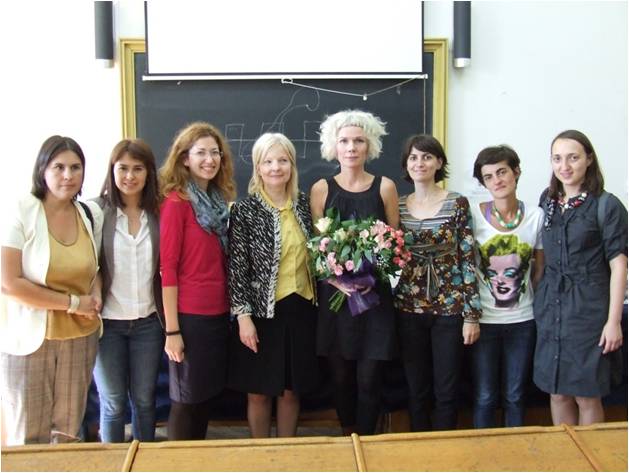
Do you keep in touch with your students? Are you up do date with their accomplishments, whether in the book market, or somewhere else?
A quality of the profession I have chosen is that, from the very beginning, I have formed a very close connection with the alumni who, even today, are one of the few people who are proficient in Norwegian language and literature in Romania. The traditional connection continues even nowadays, with the new alumni. Now, everything seems easier thanks to the digital space through which we manage to communicate, both with the students and with the alumni. At the international literary translation seminars in collaboration with NORLA, organized with Margit Walsø and with Dina Roll-Hansen, it often happens that, alongside our students, alumni who have dedicated themselves to literary translations from Norwegian into Romanian also participate. Moreover, throughout the years, we invited the alumni to participate in the collective volumes I edited alone, or together with the team of our department. Together with long-established researchers, the volumes or the issues dedicated to Norwegian language and literature or some scientific magazines include scientific papers of our students following the master’s programme or the doctoral programme, and of the Ph.Ds. in the field of Norwegian or Scandinavian literature. At Editura Cartea Cărții de Știință, where I created the Nordica collection, which I also coordinate, graduate students and doctoral students translated novels belonging to important authors of Norwegian contemporary literature: Hanne Ørstavik, Carl Fr. Tiller, Kari Brænne, Lotta Elstad. The doctoral students published their doctoral dissertations in international languages. Through the constant connections our department has with the alumni we were able to identify, through questionnaires, their interest in following a master’s programme in Norwegian language and Literature at BBU. This is also a goal the whole collective of the department strives towards.
You are also a translator from Norwegian. What were your first experiences as a translator like?
I have very fond memories of my first experience as a translator of Scandinavian literature. The first book I translated was from Swedish, it was the crime novel of a famous writer, who was very popular among 1980s public. It was Jan Mårtenson’s novel, Døden gør en tavla, and the title I chose for it, in Romanian, was Piesă neterminată pentru flașneta mecanică (Unfinished Piece for the Barrel Organ), related to the central motifs in the novel. I had to come up with another title than the original one, because the original one contained the word “death”, not at all accepted at that time. What followed was Knut Hamsun’s, Copii ai timpului lor (Children of their times),Cartea Românească – 1989, and Lars Saabye Christensen’s Beatles, Univers – 1995. The period of time in which I consolidated the Norwegian language and literature specialisation and the period of time in which I contributed as prorector in charge of international relations within the BBU did not really offer me that much free time for translations. On the basis of a personal selection of Norwegian novellas, I had the joy of translating and editing a beautiful collection, nuvele norvegien.ro, which appeared in 2005 at Editura Cartea Cărții de Știință, on the occasion of the celebration of 100 years of independence for the Kingdom of Norway, which we celebrated in Cluj at BBU and at the Romanian Writer’s Union branch in Cluj in the presence of the Ambassador of Norway in Bucharest, HE Leif Arne Ulland. For this translation I received the translation award “Eta Boeriu” from USR Cluj (The Romanian Writer’s Union), an award which honoured me. I have always tried to link my translations from the Norwegian literature to the projects organized in collaboration with the Royal Norwegian Embassy, which is how it happened in 2010, when the launch of Henrik Ibsen’s play, When We Dead Awaken, Apostrof – 2010, happened at the same time as the national premiere of the play, directed by Cătălina Buzoianu, at the Lucian Blaga National Theatre in Cluj, with the support and the participation of the Ambassador of Norway in Bucharest, HE Øystein Hovdkinn. The project was supported by the director of the National Theatre, the professor and the Ibsenologist Ion Vartic and the ArtAct Company. And, last of all, I would also like to mention the launch of the translation of the novel Vizionare (Viewing) , Univers – 2014 by Lars Saabye Christensen, in the context of an ample Norwegian architecture exhibition at the Contemporary Art Museum in Bucharest, in the presence of the Ambassador of Norway in Bucharest, HE Tove Bruvik Westberg and of the writer himself, Lars Saabye Christensen. The launch was resumed in Cluj, where it was correlated with the Norwegian bachelor’s programme from BBU, and the Norwegian guests met the students and the alumni of this programme. And, last but not least, I would also like to underline the priceless importance of the Norwegian Literature Abroad Centre (NORLA). Its presence in Romania and in other countries represents a milestone for publishing houses, budding and well-established translators, Norwegian writers, book sellers, students, professors etc. NORLA is a true Norwegian cultural institute, which has created a formidable network for Norwegian literature as world literature.
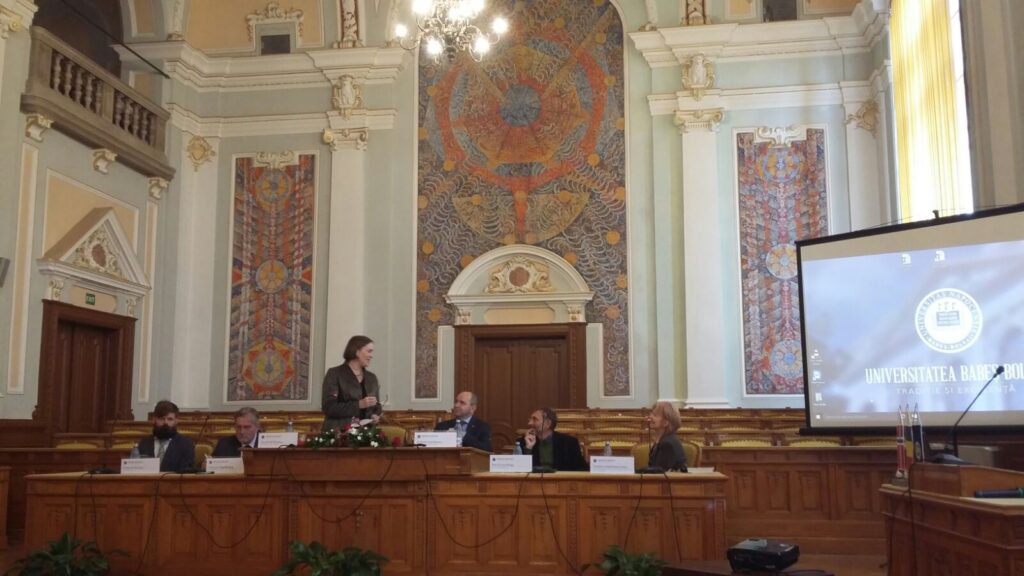
You have translated The History of Bees by Maja Lunde, published at Humanitas Fiction in 2019; the literary agency I work at sold the copyright for that book. Could you tell me what working on this book was like?
I accepted the invitation to translate the first volume of Maja Lunde’s Climate Quartet, The History of Bees. The novel was a challenge of great thematic actuality, through which the author set the tone for this climactic series. Even though the invitation to translate the first volume of this series, launched by Humanitas Fiction, made me very happy, I was equally as happy when Ivona Berceanu(English-Norwegian specialisation alumnus at the Babes-Boylai University) took over the remaining three novels; because the administrative and academic tasks took up a significant amount of my time. Ivona is the first alumnus who became completely involved in the literary translation profession, with exceptional results.
In the past years, even though the increasingly busy academic career is filled with responsibilities, I have been preoccupied with the creation of a translation school and with promoting as many new translators as possible,
who were trained in the Department of Scandinavian Languages and Literatures in Cluj. Here, we have trained young professors, Ph.Ds., young graduate students who we then recommended to the publishing houses as translators from Norwegian. And this is how, gradually, a larger group of translators trained in Cluj was formed, to which foreign experts also belong. I am pleased to mention here translators from Norwegian who were trained in the Norwegian specialisation I have created: Roxana-Ema Dreve, Ioana Mureșan, Simona Schouten, Crina Leon, Anamaria Ciobanu Babias, Daria Ioan, Ovio Olaru, Ana Suărășan, Ioana Nan, Cynthia Dan etc.
Do you think that warnings related to the environment and to its deterioration, illustrated by Maja Lunde in fiction, could have an impact in the ”real world”?
This year, more than other years, I think that we all felt the sensation that the warnings became true more strongly than ever, especially with the African heat wave which covered the south of Europe with dramatic consequences this summer. And this is just one example. It is the same with all the meteorological anomalies the whole world is dealing with. The warnings related to the environment became reality. The History of Bees offers the reader hope at the end of the book, which does not blur the seriousness of this dystopic novel one bit at the moment of its release in Norway. At the International Frankfurt Book Fair, where Norway was guest of honour in 2019, I was happy to see the Romanian edition of The History of Bees on display, alongside the German translation in the Norwegian pavilion. A great honour, and the very ingenious cover of the book was eye-catching in the myriad of books on display. I believe the impact of this novel and of other novels of this kind from Scandinavia is major in conjunction with the “skolestreik” movement of the young generation.
You are up to date concerning contemporary Norwegian literature. What are some as of yet untranslated authors you think would be compatible with the Romanian book market?
If we were to take a look at NORLA’s website only to the programme which is aimed at popularizing the new generation of Norwegian writers, Nye stemmer – Noi voci (New voices), we can see that more and more young writers are immediately translated into foreign languages, be it Scandinavian, German and so on. I have tried to promote through the collection NORDICA, which I coordinate, contemporary writers, still insufficiently translated on Romanian, or those new voices in the Norwegian literature. This is how two novels were published in the Nordica collection: one of the famous Norwegian contemporary writer Hanne Ørstavik, Tiden den tar – Timpul necesar (The Necessary Time),translated by Ovio Olaru, and the one of a new voice in Norwegian literature, Lotta Elstad, Jeg nekter å tenke - Refuz să gândesc (I Refuse to Think),translated by Ana Suărășan, both translators were trained in the Norwegian studies at BBU. Another new interesting voice is Ruth Lillegraven or the already established writer Simon Stranger, who will be translated into Romanian, or other canonical writers who have sadly been far too little or not at all translated into Romanian: Jon Fosse, Kjell Askildsen, Dag Solstad, Jan Kjærstad etc. And in the crime subgenre I should also mention Gunnar Staalesen, much translated in the Anglo-Saxon world. Literature for children and teenagers, so rich and varied, illustrated books of excellent artistic quality could enrich the shelves of public libraries and bookshops. It is recommended that the translations from Norwegian works of fiction, but also non-fiction, should be made only from the original language, from Norwegian, putting an end to the translations from a contact language. And the purpose of a well-informed Norwegian programme graduate, who will also choose to be a translator from Norwegian literature – fiction or non-fiction – should be to suggest titles and translations directly from the Norwegian language. (Translated into English by Irina-Adelina Găinușă.)
References:
Sanda Tomescu Baciu. „Programul de licență de limba și literatura norvegiană în România, la Universitatea Babeș-Bolyai – o construcție instituțională cu suport norvegian” in 30 years of Norwegian language and literature at BBU - 30 år med norsk språk og litteratur ved BBU - 30 de ani de limbă șii literatură norvegiană la UBB,, Eds. Sanda Tomescu‐Baciu, Roxana‐Ema Dreve, Raluca‐Daniela Duinea, Raluca Pop, Editura Presa Universitară Clujeană, 2021, pp. 23-30.

